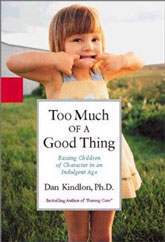 Last week dozens of Assistant Heads from independent schools from across the country gathered in Montreal to share and learn during an annual four-day conference. On one of these days this group of educational administrators had the privilege of working directly with Dr. Dan Kindlon, a renowned clinical and research psychologist and professor at Harvard University in Boston. Dr. Kindlon is also a reputed author. His first book, Raising Cain: Protecting the Emotional lives of Boys saw both he and his co-author, Dr. Michael Thompson, jump to the top of the NY Times Bestseller List. It was published around the time of the tragic Columbine high school shootings in Colorado in 1999, and tens of thousands of parents bought the book in an effort to better understand what could trigger such violence among teenage boys.
Last week dozens of Assistant Heads from independent schools from across the country gathered in Montreal to share and learn during an annual four-day conference. On one of these days this group of educational administrators had the privilege of working directly with Dr. Dan Kindlon, a renowned clinical and research psychologist and professor at Harvard University in Boston. Dr. Kindlon is also a reputed author. His first book, Raising Cain: Protecting the Emotional lives of Boys saw both he and his co-author, Dr. Michael Thompson, jump to the top of the NY Times Bestseller List. It was published around the time of the tragic Columbine high school shootings in Colorado in 1999, and tens of thousands of parents bought the book in an effort to better understand what could trigger such violence among teenage boys.
Dr. Kindlon’s latest book Too Much of a Good Thing: Raising Children of Character in an Indulgent Age presents some simple but key messages to parents today. He spoke at LCC last Thursday evening, and I would like to pass on a few key takeaways.
As the title of Dr. Kindlon’s book indicates, he is concerned about the degree to which today’s parents indulge their children. His clear advice: don’t give children or adolescents everything they want, set clear limits and stick to them. This sounds simple, but Dr. Kindlon’s research shows that an absence of appropriate boundaries and too little delayed gratification have had a negative impact on young people across North America. He also noted that in our busy lives with demanding schedules for work and activities, family time has decreased by half since the 1980s—a rather startling development. Evidence shows that regular family activity, in particular family dinners, has a direct correlation to keeping children focused and positive.
This actually leads to better results at school.
Finally, Kindlon reiterated the impact of the North American crisis in youth sleep deprivation. The average teen now gets less than seven hours of sleep per night, while needing at least eight and ideally nine hours to function effectively. He noted that the cumulative physiological effect is equivalent to the teen smoking one pack of cigarettes a day, with a host of harmful effects, including a diminished capacity to embed learning after a day of schooling.
This may not be new information. However, it’s important to remember the importance of boundaries and limits, family time, and sleep in the growth, development and good health of our children. For all parents, awareness is important, but acting on our knowledge is critical if students are to meet their true potential. —Chris Shannon, Headmaster
